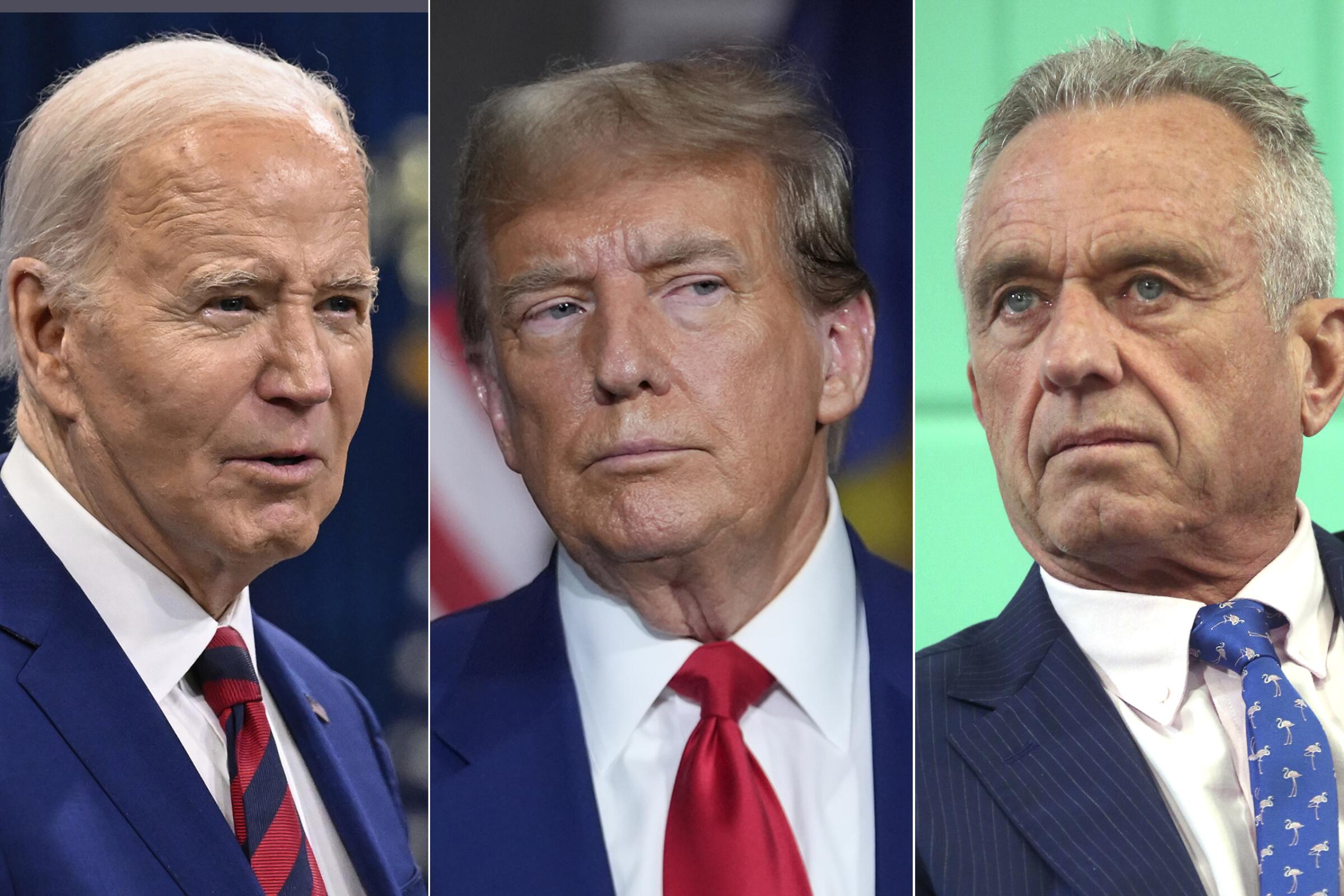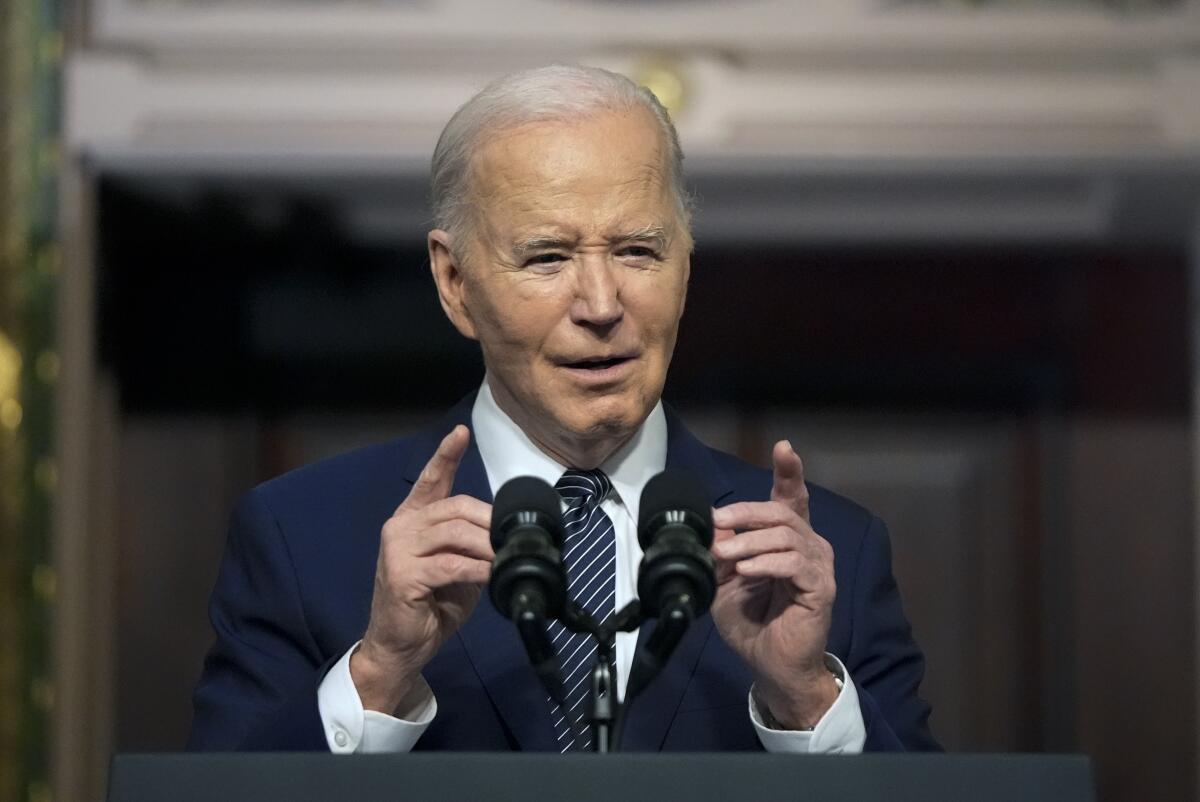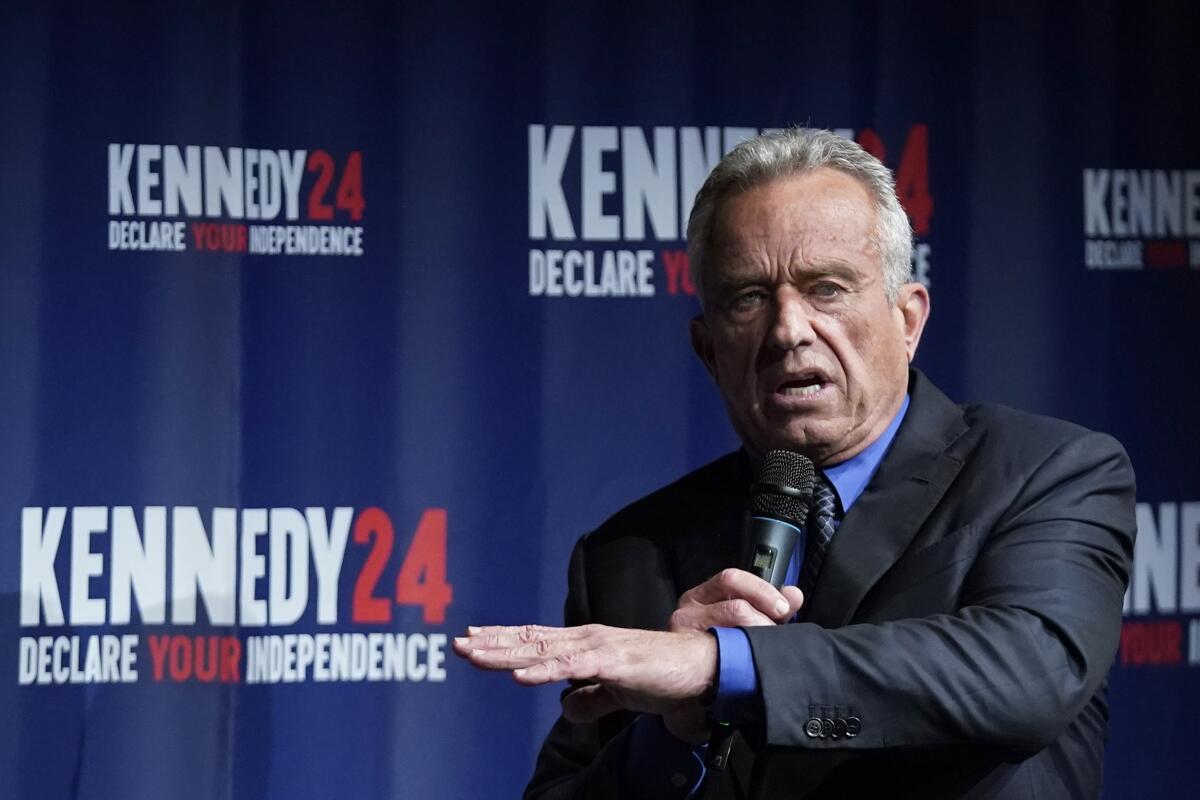
California voters regularly tell pollsters that the housing crisis and homelessness are the most important issues to them.
Tents on street corners is how most Californians understand the crisis, which is normally viewed as the domain of local politicians. The reality is that much of the funding to address homelessness or housing insecurity flows from the federal government. About 28% of the country’s homeless population, or about 180,000 people, live in California.
Nationally, homelessness grew again in 2023 and the housing affordability crisis is at the forefront of voters’ minds this election season.
The three most prominent presidential candidates — President Biden, former President Trump and Robert F. Kennedy Jr. — have all offered some insights to their views on the subject.
President Biden

Biden has recently made housing affordability far more central to his reelection campaign — though his interest in the subject goes way back. When Biden was starting in the Senate some 50 years ago, Sen. Hubert Humphrey advised him to “become Mr. Housing,” Politico reported.
He didn’t exactly do that, but as president he has taken big swings on the topic — some of which failed. His $2-trillion “Build Back Better” domestic policy agenda included $150 billion for a suite of housing proposals. When that bill was scaled back at the behest of Republicans and Sen. Joe Manchin III (D-W.Va.), the housing pieces were left on the cutting room floor.
During the COVID-19 pandemic, the stimulus packages included billions of dollars for rental assistance, housing vouchers and grants to build new temporary and permanent housing. This year, Biden has called for a $10,000 tax credit for first-time home buyers, and for funding to build or renovate more than 2 million homes. He called for the creation of a $20-billion competitive grant fund to help accelerate housing creation. His administration is also looking for ways to provide incentives for municipalities to do away with stringent zoning restrictions.
The latest Biden budget proposal includes about $258 billion devoted to housing. It includes proposals to restrict fees that renters must pay when signing a lease and expand popular rental assistance programs such as the housing choice voucher.
These proposals would require Congress to enact legislation, which seems unlikely in an election year. In the meantime homelessness has grown during his tenure.
Former President Trump

Trump has said little about how he’d address housing or homelessness since announcing his reelection bid last year. His campaign website lists ending veteran homelessness as a priority, though it offers no specifics.
“Joe Biden puts illegal aliens before homeless veterans and we cannot let this happen any longer,” the former president said in a video. “The American veteran is one of our greats. These are great, great people. We have to take care of them.”
Last April, Trump released a video saying that American cities had been sullied by “the homeless, the drug-addicted, and the violent and dangerously deranged” — adding later that he would “ban urban camping.” He also said that violators would be arrested but be “given the option to accept treatment.”
These sorts of laws have traditionally been the domain of local government. In recent years, though, federal lawsuits have given judges an opening to weigh in on the laws related to punishing people for sleeping in public spaces.
During Trump’s presidency, homelessness nationwide went up, and he has offered few specifics about how he’d bring down home prices. He’s mused about getting rid of the Fair Housing Act, which protects minorities from discrimination in the purchase or renting of housing. His campaign characterizes these regulations as waging a “full-scale war on the suburbs.”
During his tenure, talking about homelessness became a shorthand for bashing Democrat-run states and cities. His proposed budgets often included drastic cuts to departments that traditionally deal with this issue, such as the Department of Housing and Urban Development.
Like Biden, Trump’s advisors have focused in on eliminating layers of regulation to make it easier and cheaper to build more housing. That federal push had few concrete results.
Robert F. Kennedy Jr.

The scion of one of America’s most famous political families has never held elected office and thus has no record to go by.
His campaign has released some plans and videos related to affordability, according to his website. Kennedy’s ideas revolve around changes to the tax code, pushing for local zoning changes and seeking out ways to lower home mortgage interest rates.
“Housing is probably the most important issue in terms of building wealth in poor communities,” he said in a video released by his campaign.
Kennedy, according to his campaign website, wants “local governments to bring city-owned land and buildings back onto the market.” He also talks about creating a new government-backed bond, with 3% interest, that people could apply for to help them buy a home.
Trump’s 2017 tax plan created Opportunity Zones, allowing investors could reap tax benefits by investing in certain low-income communities. The Times reported in 2022 that the incentive mostly served as a windfall for rich people. Kennedy wants to “change business depreciation rules and reform the ‘enterprise zones’ that have contributed so much to gentrification.”
Like Trump and Biden, Kennedy wants to find a way to get local government to make changes to zoning rules. He said little about how that would work except that he wants to “change zoning laws to allow ancillary dwelling units on more properties, to make housing available, bring families together, and provide homeowners with rental income,” his campaign website states.
“More supply means lower prices,” he said.
Related coverage
You are reading our Politics newsletter
Sign up to get analysis from our journalists and the latest political news in your inbox twice a week
You may occasionally receive promotional content from the Los Angeles Times.